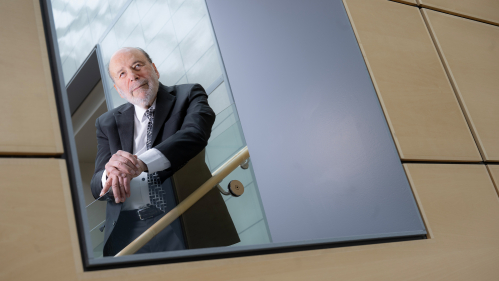Rutgers Chemist Receives Top Honor for Groundbreaking DNA and Genetics Research

Kenneth J. Breslauer’s research has touched different aspects of society from improving the development of medicine to treat disease to making it easier to solve criminal cold cases
Kenneth J. Breslauer, whose work helped lay the foundation for many of today’s major advances in genetics and precision medicine during his 50 years as a researcher at Rutgers, has received one of the top honors in his field.
In February, he will be one of five scientists in the world recognized for contributions to understanding the structure of DNA, its function and the role it plays in modern medicine as a 2026 fellow of the International Biophysical Society.
His work has provided scientists with a better understanding of how small changes in molecules can have big effects on health and is helping to shape the future of personalized medicine.
“His research has transformed multiple areas of biophysics and biophysical chemistry while also linking fundamental science to biomedical applications with broad impact on human health,” said Lawrence Williams, chair of the Department of Chemistry and Chemical Biology in the School of Arts and Sciences at Rutgers University-New Brunswick.
Breslauer, the Linus C. Pauling Distinguished Professor of Chemistry and Chemical Biology, said the award is especially meaningful because it comes from an interdisciplinary community that recognizes how physical chemistry can explain the inner workings of life itself. “The work I’ve done helps scientists better understand how molecules behave in healthy versus unhealthy situations.”
Breslauer and his laboratory colleagues at Rutgers have built large, detailed thermodynamic databases that help researchers understand how different segments of DNA interact. Knowing which genes are active in a disease allows for diagnosing, predicting and targeting treatment. Breslauer said this has made it easier to design drugs that work more effectively with fewer side effects.
“This approach has helped improve how new medicines are developed,” Breslauer said. “Many drug companies now use this method to design better treatment that can target diseases more precisely.”
The research done by Breslauer has helped create tools, like the tiny pieces of DNA used in COVID-19 swabs, that have been used in medical testing during the pandemic. It has also led to the development of better tools to detect genetic mutations and inherited diseases like breast cancer and cystic fibrosis earlier and more precisely. His energy-based DNA models are also being used to analyze old or damaged DNA samples, which have made it easier to solve criminal cold cases.
These improvements help make tests faster, more accurate and more reliable. Breslauer, who thinks of himself as a molecular linguist, said his goals have always been to provide scientists with a molecular map to show how biological molecules behave under different conditions.
“This energy-based approach to drug design goes beyond traditional methods, and it’s now widely used across the pharmaceutical industry to create treatments that are more effective and have fewer side effects. It’s a shift that’s already improving lives and will continue to shape the future of medicine,” Breslauer said. “It has helped us build better tests, develop more precise medicine and ultimately improve human health.”
In addition to his original research, Breslauer has served in leadership roles at the university, including founding dean of the Division of Life Sciences, vice president for research, and vice president for Health Science Partnerships. He has helped build state-of-the-art research facilities, expanded interdisciplinary programs and played a key role in the creation of the Life Sciences Building, a new Proteomics Building, the Stem Cell Institute of New Jersey, the New Jersey Biomaterials Center and the new Chemistry and Chemical Biology Building.
“Rutgers has been a remarkable home for ambitious science,” he said. “The collaborative environment here has been essential to turning research into real-world applications.”
Over his 52-year career at Rutgers, Breslauer has made an important impact on science and the university itself. He has taught thousands of undergraduate students while mentoring doctoral students in his laboratory. Although he had offers from other top research universities and institutions, Breslauer said he decided his life’s work would be conducted at Rutgers.
“I felt like I would be abandoning my academic child just as it was flourishing,” said Breslauer, who started at Rutgers in 1974 as an assistant professor in the Department of Chemistry. “So, I decided to stay at Rutgers, my first academic home, and continue to help grow its life sciences/biomedical programs to the next level of excellence.”


